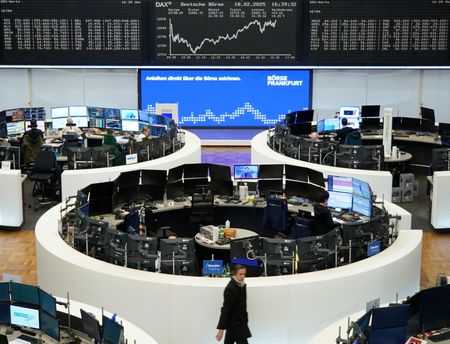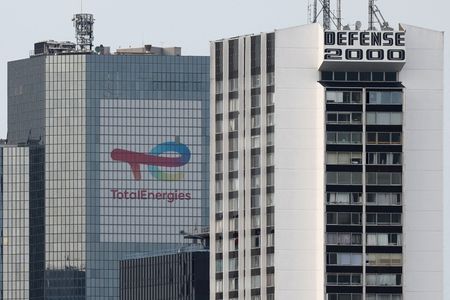By Lucy Raitano
LONDON (Reuters) – Unusually high volatility in the shares of European companies around their earnings days has prompted a growing number of typically cautious longer-term investors to jump on big price swings.
Volatility in European shares on results days has reached a near-record high, Bank of America data shows, with the fourth-quarter earnings season only around half complete.
Tom Lemaigre, portfolio manager on the European Equities Team at Janus Henderson Investors, was among the long-term investors Reuters spoke to who have found opportunities in the current volatility.
“If you have something that looks incredibly oversold, I can buy more, and if something looks overbought, I can profit-take. It allows me to be tactical,” said Lemaigre, who said he co-manages around 7.5 billion euros ($7.8 billion) in assets.
“I always want to be doing this alongside taking a longer-term view. If something falls 20% in one day and I’ve got a three-year time horizon then it can be seen as an opportunity to potentially add or start a position,” he said.
A Reuters analysis in 2024 found hedge funds taking a wide range of trading approaches and a changing market structure were behind the trend that has spurred single-stock volatility to multi-year highs. BofA’s most recent data shows that companies that missed fourth-quarter expectations have recorded a median one-day underperformance of 2.6%, the biggest since the bank’s records began in 2012. Those beating on earnings per share have recorded a median outperformance of 1.7%, the second strongest on record. Barry Glavin, head of equity platform at Amundi, Europe’s largest asset manager, also said his team has noticed the trend of outsized reactions to results. “As disciplined long-term investors who are quite price sensitive, if we get an opportunity to buy a stock at a lower price and our investment thesis is unchanged, we’ll take it,” he said.
BIG MOVES, BOTH WAYS
European companies’ quarterly reports have so far proved generally rosy, as expected. Shares of French luxury giant Richemont recorded their biggest daily jump in 17 years on January 16, surging 16.4% after results beat expectations.
On their respective results days, shares in Dutch payments firm Adyen rose 14.4% and Germany’s Infineon jumped by more than 10%.
Among the companies that saw their share price fall sharply, Swiss lender UBS dropped by 7% on its results day, cognac maker Remy Cointreau lost 7.4%, Randstad, the world’s largest employment agency, fell 6.5%, and Europe’s largest travel operator Tui slid more than 10%.
LONG-TERM VIEW; SHORT-TERM OPPORTUNITIES
Amundi’s Glavin said that while volatility may be uncomfortable, it can offer active long-term managers an opportunity to add value.
Over at RBC BlueBay Asset Management, senior portfolio manager and head of European Equities David Lambert said his team would buy shares in an appropriately valued business after its results if it sees an outsized move on an unchanged outlook.
“We would trade around those – not aggressively – but there have been more opportunities more recently given some of the volatility,” said Lambert, who manages around C$7 billion ($4.9 billion) in assets. “Long term you have to be nimble and have the ability and the agility to add and to take away from positions if the market moves aggressively…you might have a move to the upside, which can be hard to rationalise sometimes, so why not lock in some of that?”
($1 = 0.9570 euros)
($1 = 1.4201 Canadian dollars)
(Reporting by Lucy Raitano; Editing by Amanda Cooper and Kirsten Donovan)









